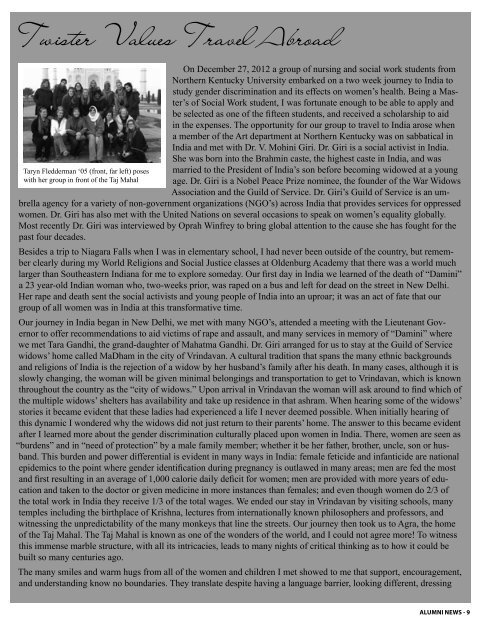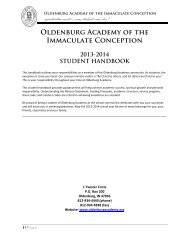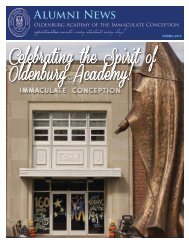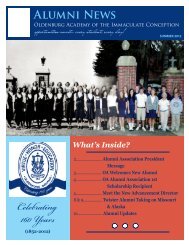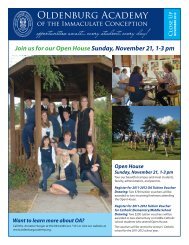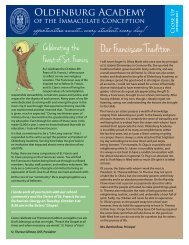Summer 2013 Alumni Newsletter - Oldenburg Academy
Summer 2013 Alumni Newsletter - Oldenburg Academy
Summer 2013 Alumni Newsletter - Oldenburg Academy
Create successful ePaper yourself
Turn your PDF publications into a flip-book with our unique Google optimized e-Paper software.
Twister Values Travel Abroad<br />
Taryn Fledderman ‘05 (front, far left) poses<br />
with her group in front of the Taj Mahal<br />
On December 27, 2012 a group of nursing and social work students from<br />
Northern Kentucky University embarked on a two week journey to India to<br />
study gender discrimination and its effects on women’s health. Being a Master’s<br />
of Social Work student, I was fortunate enough to be able to apply and<br />
be selected as one of the fifteen students, and received a scholarship to aid<br />
in the expenses. The opportunity for our group to travel to India arose when<br />
a member of the Art department at Northern Kentucky was on sabbatical in<br />
India and met with Dr. V. Mohini Giri. Dr. Giri is a social activist in India.<br />
She was born into the Brahmin caste, the highest caste in India, and was<br />
married to the President of India’s son before becoming widowed at a young<br />
age. Dr. Giri is a Nobel Peace Prize nominee, the founder of the War Widows<br />
Association and the Guild of Service. Dr. Giri’s Guild of Service is an umbrella<br />
agency for a variety of non-government organizations (NGO’s) across India that provides services for oppressed<br />
women. Dr. Giri has also met with the United Nations on several occasions to speak on women’s equality globally.<br />
Most recently Dr. Giri was interviewed by Oprah Winfrey to bring global attention to the cause she has fought for the<br />
past four decades.<br />
Besides a trip to Niagara Falls when I was in elementary school, I had never been outside of the country, but remember<br />
clearly during my World Religions and Social Justice classes at <strong>Oldenburg</strong> <strong>Academy</strong> that there was a world much<br />
larger than Southeastern Indiana for me to explore someday. Our first day in India we learned of the death of “Damini”<br />
a 23 year-old Indian woman who, two-weeks prior, was raped on a bus and left for dead on the street in New Delhi.<br />
Her rape and death sent the social activists and young people of India into an uproar; it was an act of fate that our<br />
group of all women was in India at this transformative time.<br />
Our journey in India began in New Delhi, we met with many NGO’s, attended a meeting with the Lieutenant Governor<br />
to offer recommendations to aid victims of rape and assault, and many services in memory of “Damini” where<br />
we met Tara Gandhi, the grand-daughter of Mahatma Gandhi. Dr. Giri arranged for us to stay at the Guild of Service<br />
widows’ home called MaDham in the city of Vrindavan. A cultural tradition that spans the many ethnic backgrounds<br />
and religions of India is the rejection of a widow by her husband’s family after his death. In many cases, although it is<br />
slowly changing, the woman will be given minimal belongings and transportation to get to Vrindavan, which is known<br />
throughout the country as the “city of widows.” Upon arrival in Vrindavan the woman will ask around to find which of<br />
the multiple widows’ shelters has availability and take up residence in that ashram. When hearing some of the widows’<br />
stories it became evident that these ladies had experienced a life I never deemed possible. When initially hearing of<br />
this dynamic I wondered why the widows did not just return to their parents’ home. The answer to this became evident<br />
after I learned more about the gender discrimination culturally placed upon women in India. There, women are seen as<br />
“burdens” and in “need of protection” by a male family member; whether it be her father, brother, uncle, son or husband.<br />
This burden and power differential is evident in many ways in India: female feticide and infanticide are national<br />
epidemics to the point where gender identification during pregnancy is outlawed in many areas; men are fed the most<br />
and first resulting in an average of 1,000 calorie daily deficit for women; men are provided with more years of education<br />
and taken to the doctor or given medicine in more instances than females; and even though women do 2/3 of<br />
the total work in India they receive 1/3 of the total wages. We ended our stay in Vrindavan by visiting schools, many<br />
temples including the birthplace of Krishna, lectures from internationally known philosophers and professors, and<br />
witnessing the unpredictability of the many monkeys that line the streets. Our journey then took us to Agra, the home<br />
of the Taj Mahal. The Taj Mahal is known as one of the wonders of the world, and I could not agree more! To witness<br />
this immense marble structure, with all its intricacies, leads to many nights of critical thinking as to how it could be<br />
built so many centuries ago.<br />
The many smiles and warm hugs from all of the women and children I met showed to me that support, encouragement,<br />
and understanding know no boundaries. They translate despite having a language barrier, looking different, dressing<br />
ALUMNI NEWS - 9


